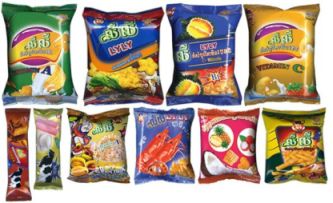Background
In 2002 with little capital and a rice-cracker processing machine bought from a foreign company, Mrs. Keo Mom and her husband began a small food product manufacturing business out of their home. The couple produced rice crackers in small quantities to sell at markets in Phnom Penh and its outskirts.

Branding and Trademarks
After consultations with government authorities, Mrs. Keo Mom decided to register her business as a handicraft manufacturing outlet under the name Ly Ly Food Industry, Co. Ltd. (Ly Ly Food). Her rice cracker was the first locally-made product sold in plastic-packaging in Cambodia.
Aside from the company name, from 2003 Mrs. Keo Mom has also protected images as trademarks (double cows and a rabbit). Ly Ly Food now owns several trademarks and has been using them for its rice cracker products. Furthermore, Mrs. Keo Mom has invested considerable resources to continuously improve and make her packaging more appealing. This has been an important factor in developing the brand name as well as promoting the company’s image in the country.
Step by step, Mrs. Keo Mom has led her company to become one of the most attractive local food producers and it has gained a good reputation through its brand names, which have gradually become associated with healthy and delicious food. Ly Ly Food’s trademarks and attractive packaging designs have been fundamental to its outstanding achievements.
IP Management
Mrs. Keo Mom has participated in various seminars and workshops on industrial property and other subjects related to the development of Small and Medium-Sized Enterprises (SMEs). With the knowledge she acquired at these events, she set out the following intellectual property (IP) strategy which continues to play an important role in the development of her business:
- to design more images, more vivid colors and attractive devices on the packaging;
- to seek IP protection by registering trademarks and industrial designs with the intellectual property office;
- to create consumer confidence in her trademarks which meet national quality standards;
- to promote awareness of the company’s name and product brands through active participation in national exhibitions and other promotion events;
- to improve the quality of the products (e.g. taste, texture and safety);
- to provide an effective service for wholesalers as well as retailers; and
- to regularly advertise the company’s trademarks and brand names.
Through this strategy, IP has played a significant role in increasing the competitiveness of Ly Ly Food products. Mrs. Keo Mom has found that the registration and promotion of trademarks are effective means of upgrading the value of the company in a competitive market. Strong IP protection provides more business opportunities to the company, which eventually leads to obtaining more capital and increased production.
Commercialization
Under a license granted by the Cambodian government, Ly Ly Food can produce various kinds of rice crackers, however the company focuses on manufacturing certain type of products targeting children. Mrs. Keo Mon aims to supply her products to all kinds of retailers across the country, from small outlets in the provinces to the big shopping malls in the capital, in order to compete, in particular with imported products. She has also established a principle that the product must be of good quality, healthy, safe and attractively designed and packaged for consumers. In an effort to contribute to the improvement of maternal and child nutrition in Cambodia, Ly Ly Foods also created a range of vitamin enriched products.

The trademarks and attractive packaging designs have been fundamental to its outstanding achievements (Photo: Ly Ly Food)
Business Results
Ly Ly Food presently produces rice crackers in ten flavors such as chocolate, crab and potato, durian, egg and strawberry. These products are sold in cities and remote areas throughout the country.
Ly Ly Food has augmented its production by purchasing more machineries and setting up advertising mechanisms and promotion schemes. The company’s annual sales have reached US $1,500 million.
Ly Ly Food has over 95 employees, and has contributed to the development of SMEs in Cambodia and created employment opportunities for poor and disadvantaged persons in rural areas.
A Model for SME Entrepreneurs: Strong Leadership and a Defined IP Strategy
Ly Ly Food’s success is derived from the strong leadership and initiatives of Mrs. Keo Mom who pursued a well defined IP strategy as a key to develop her business.
Source: WIPO

 Client Focus
Client Focus